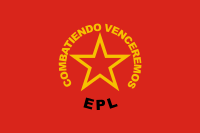| Popular Liberation Army Ejercito Popular de Liberacion | |
|---|---|
| Participant in the Colombian armed conflict | |
 Flag of the EPL | |
| Active | 1967–present |
| Ideology |
Communism, Anti-Revisionism Marxism–Leninism, Hoxhaism; formerly Maoism |
| Leaders | Francisco Caraballo, Megateo (2013)[1] |
| Area of operations | Colombia, above all in Norte de Santander |
| Strength | 90 - 200 (Various estimates)[1][2] |
The Popular Liberation Army (Spanish language: Ejército Popular de Liberación , EPL), is a Colombian guerrilla group created in 1967. Most of its former members demobilized in 1991, forming the Esperanza, Paz y Libertad (Hope, Peace and Liberty) party, but a dissident faction, lead by alias "Megateo," continues operating.
Origins[]
The EPL was founded by the Communist Party of Colombia (Marxist–Leninist), PCC(ml), a 1967 offshoot of the main Colombian Communist Party that disagreed with the Soviet ideological tendencies then displayed by the latter. The new party created the EPL that same year, and implemented its strategy of promoting socialist revolution from a rural base in the countryside in order to launch a future offensive against urban centers, where it tried to insert urban cells, while simultaneously engaging in sabotage and activities considered by international observers as terrorist.
Historical development[]
The EPL's first military operations were in the Córdoba Department, on the Caribbean region, during the late 1960s. Internal dissension and the deaths of some of its key leaders during the 1970s weakened the EPL's operational capabilities. The EPL's efforts were initially unsuccessful, some of the groups main leaders were killed in military operations during the 1970s, and it apparently did not gain as much intellectual sympathy or recruits as the larger guerrilla organizations (FARC, M-19 and ELN), even after the group announced in 1980 that it would abandon orthodox Maoism in favor of Hoxhaism. A small splinter group, the Pedro León Arboleda Movement, named after a deceased 1975 commander, had been created in 1979.
The EPL declared a 1984 cease-fire together with several other guerrilla groups that began and maintained negotiations with the government. The 1985 murder of the group's leader Ernesto Rojas lead to the EPL's official breaking of the cease-fire. [1] Unlike the official Colombian Communist Party, the Maoist PCC(ml) did not have official legal status in Colombia at this time.
Military operations executed by the official state armed forces and the actions of private paramilitary groups against the EPL's militants and its political supporters weakened the group and would have forced internal divisions within its structure.
Partial demobilization[]
By 1991, the EPL had rejoined peace talks with the administration of president César Gaviria and a total of some 2000 people affiliated to the guerrilla group demobilized, including both armed and unarmed members. A smaller, dissident faction, sometimes calling itself "Ejército Popular de Liberación - Línea Disidente" (Popular Liberation Army - Dissident Line), under Francisco Caraballo disagreed with the demobilization, insisted on fighting and did not demobilize. Caraballo himself was eventually captured by Colombian authorities in 1994 and his faction continued guerrilla operations on a smaller scale. [2]
Most of the demobilized guerrillas formed Esperanza, Paz y Libertad (Hope, Peace and Liberty), a political party, which claimed to defend the interests of workers and labor unions, especially around the Urabá area in the departments of Antioquia and Córdoba. The FARC, the remaining EPL dissidents and the ELN considered Esperanza, Paz y Libertad and all the demobilized EPL to be "traitors" and paramilitary collaborators, initiating a series of attacks and assassination attempts against the former EPL members. Some of the ex-EPL members apparently would have eventually joined and participated, individually and allegedly without the support of the new political party, in paramilitary operations against the FARC and their former comrades.
In 1998, Human Rights Watch reported that the FARC had begun killing a number of ex-EPL members since 1991: "Investigators pinpoint 1991 as the year the FARC began to massacre perceived political rivals in the Esperanza political party formed by amnestied EPL guerrillas and their supporters. The FARC and its urban militias were believed responsible for 204 murders of Esperanza members and amnestied EPL guerrillas from 1991 to 1995." [3] In a 1999 report, the Inter-American Commission on Human Rights (IACHR) also held the FARC responsible for a number of massacres against Esperanza, Paz y Libertad members or sympathizers. [4]
Human Rights Watch believed Caraballo's EPL faction to be responsible for a comparatively smaller number of deaths: "According to Esperanza, 348 of its members and amnestied EPL guerrillas were murdered between 1991 and the end of 1995. Of that number, they believe sixty-one were killed by the EPL under Caraballo’s command." [5]
2013 interview[]
In 2013, Colombian weekly Semana interviewed alias "Megateo," the leader of the EPL in Norte de Santander. Megateo denied any involvement in drug trafficking and said the EPL's struggle was a political one. During the interview, Megateo was accompanied by some 50 EPL rebels carrying brand new Galil rifles and Colombian army uniforms.[1]
References[]
External links[]
- Esperanza, Paz y Libertad Homepage (Spanish)
| <templatestyles src="Hlist/styles.css"></templatestyles><templatestyles src="Module:Navbar/styles.css"></templatestyles> | |||||||||||||||
|---|---|---|---|---|---|---|---|---|---|---|---|---|---|---|---|
|
Participants |
Key aspects | ||||||||||||||
|
|
• La Violencia (1948-1958) |
• Sinaltrainal v. Coca-Cola (2001) • Kidnappings in Colombia • Illegal drug trade in Colombia • Democratic security | |||||||||||||
| Guerrillas |
Government of Colombia | Paramilitaries | |||||||||||||
|
• FARC-EP Former guerrillas Linked to |
Former government program Linked to
|
• Águilas Negras Former paramilitaries Linked to | |||||||||||||
| |||||||||||||||
The original article can be found at Popular Liberation Army and the edit history here.